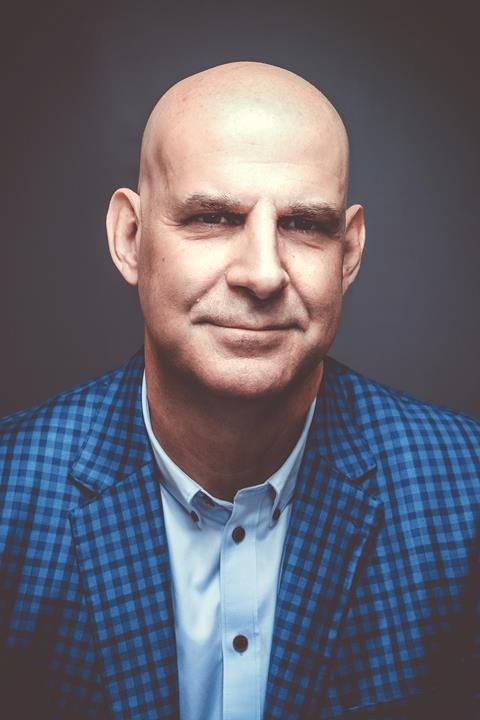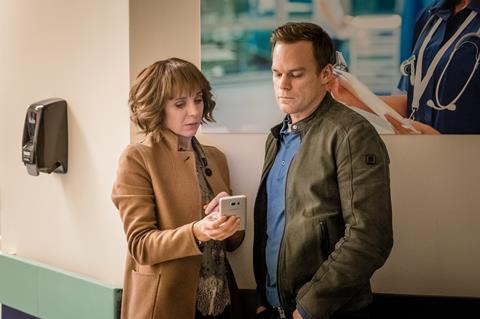With an eight-part series based on his book The Stranger in production for the streamer, writer Harlan Coben talks to John Elmes about golden handcuffs deals and writing in his pyjamas
It’s morning in New Jersey and Harlan Coben is at home on the phone, deep in conversation with Broadcast – still dressed in his pyjamas.
Fortunately his choice of attire is more indicative of his personal and working life than how seriously he’s taking the interview. “My wife has a real job and actually has to go to work,” he jokes.

Asked if writing in his sleepwear is integral to his creative process, the author and screenwriter says he will change later in the day, but adds: “Whatever works, I do it until it stops working.”
Take his approach to his novel The Stranger, a TV adaptation of which is in production for Netflix.
“Some people have a specific office, room or view and do the same thing every day when writing. I don’t,” he says. “I’ll find a method that works, be it a certain coffee shop or time of day.”
In this case, his method was more expensive than a coffee. “Towards the end of the book, I took my first Uber into New York City from my home. I was sitting in the back, feeling guilty about spending the money, so I started to write, and I wrote really well. For three weeks after, I took Ubers wherever I went and finished the book.”
The series based on that novel is being produced by Nicola Shindler’s Red Production Company, which handled previous projects – Netflix original drama Safe and Sky’s The Five. Coben says the show is the “best thing” they’ve done together, and that he was fortunate to work with “exactly the same team” as on the previous shows.
Netflix’s series, which is due to air next year, is the first of Coben’s novels to be adapted by the streaming giant and forms part of an exclusive five-year overall deal to develop Coben’s existing works into both English- and foreign-language series and films.
His novel No Second Chance was adapted into a series for French channel TF1 before being licenced by Netflix.
Global approach
On the wider point of ‘golden handcuffs’ deals, Coben is pragmatic. “I certainly wouldn’t tell the likes of Phoebe Waller-Bridge what to do,” he says. “As was likely the case with Phoebe and others like Shonda Rhimes, a lot of the drive is where we can be our most creatively free.
In my case, Netflix gave me the freedom to work around the world to mine the greatest talent. This was the best chance for my creative vision – without a network looking over my shoulder.”
In The Stranger, Coben’s 27th novel, Spooks’ Richard Armitage plays Adam Price, whose perfect life and watertight marriage is destroyed when a mysterious person reveals a shocking secret about his wife, Corinne.

Coben admits that repurposing his work for TV is arduous – “I thought it would be easier, frankly, but it really wasn’t” – and warns other authors it is important to feel they have licence to change their stories for the screen. The Stranger, for example, was set in the US but the show is based in the UK.
“I don’t believe, as authors of the novels, that we should be slavishly devoted to the text when we adapt,” he says. That means he often suggests where the narrative can veer off – sensible, considering no one knows his texts better.
“I like making changes,” he says. “The first thing for me is to separate the different mediums. While a novel has an overall structure, it’s about not being afraid to change things [for TV]. We did that a lot in The Stranger.”
Coben describes the novel as “darker” than his other books. “It’s one of my favourite novels and is based on the idea of secrets and a person who comes along and drops bombs on your life. It’s something we can all relate to.”
The series has been developed as a closed story – “I’m not setting this up so that when it ends, I’m ready for series two,” says Coben – so viewers will get “all the answers”.
Coben says adapting a book for TV is a different challenge – and opportunity – to writing one because every reader will have a slightly different perspective on the novel.
“The comparison I would make is if you gave me a picture and asked me to make it into a painting or sculpture,” he says. “It’s going to be something different, visually. How do you present that on screen?”
“With an eight-episode TV series, it’s like you have this beautiful tree in your house and you’re finding cool ornaments and different ways of pruning it to make it look even more spectacular”
Coben enthuses about the subplots he has been able to introduce into The Stranger. He seems to relish confounding those who have read his book and will “come into the series smugly” yet be surprised by its new themes and plots.
“With an eight-episode TV series, it’s like you have this beautiful tree in your house and now you’re finding cool ornaments and different ways of pruning it to make it look even more spectacular,” he says.
“If you’ve read the book of The Stranger, you may know the ending, but you won’t know all of it. As a writer, I can’t quite get wanting to surprise you out of my head.”
Working with Red
Coben credits Netflix and Red for giving him a platform to become a prolific TV creative and his joy at working on British productions for the streamer is obvious. If his other Netflix projects become UK productions, he will be keen to team up with Red and its founder Shindler, whom he calls “his partner” on productions.
In 2016, the duo formed Final Twist Productions as a vehicle to collaborate in the US, but thus far all their collaborations have been in the UK via Red.
Overall, Coben has taken to the “collegial” nature of TV production, which is opposite to the introspective nature of novel writing.
“TV is a really new thing for me and I’m enjoying it – I get obsessed with it and I’m working with Red every day,” he says. “Part of the reason I’m a novelist is because I’m an introvert and spend a lot of time alone in a room. I don’t regret that for a second, but it is nice to get out of that room once in a while, to work and collaborate.”
The reach of TV is a draw to writers, he adds. “No matter how many books you sell, when you’re on a set or you do the first table read, you think, ‘Wow, I had this idea in my home and now here we are in the UK with 200 people putting it out on screens in 190 countries’. If that doesn’t jazz you, you’re in the wrong business.”
Part of Coben’s enjoyment comes from this outsider perspective. He happily admits he’s not a “follow-the-market- guy”, meaning he’s not overly concerned with suggestions of scripted-TV saturation or that new entrants will consume the industry.
“As a creative, I’m content,” he says. “I try not to pay attention to what’s going on around me. That sounds naïve, but as a novelist I kept hearing that Barnes & Noble was going to destroy the business, and then Amazon or Kindle were. I stuck my fingers in my ears and said, ‘I can’t hear you’ because I knew I couldn’t control any of that.
“It’s the same with TV. Do new entrants mean that among the million shows out there, there’s going to be a lot of crap? Sure, but there’s also going to be great stuff.”



























![GS (392)[61]](https://d11p0alxbet5ud.cloudfront.net/Pictures/100x67/9/3/5/1448935_gs39261_950366.jpg)



No comments yet